In the context of her recent exhibition at the Centre for Contemporary Art (CCA) Lagos, curator Favour Ritaro reflects on learning to work with constraints and relying on the strong community of practitioners built by CCA founder, Bisi Silva. Her practice remains in conversation with the renowned late Nigerian curator.
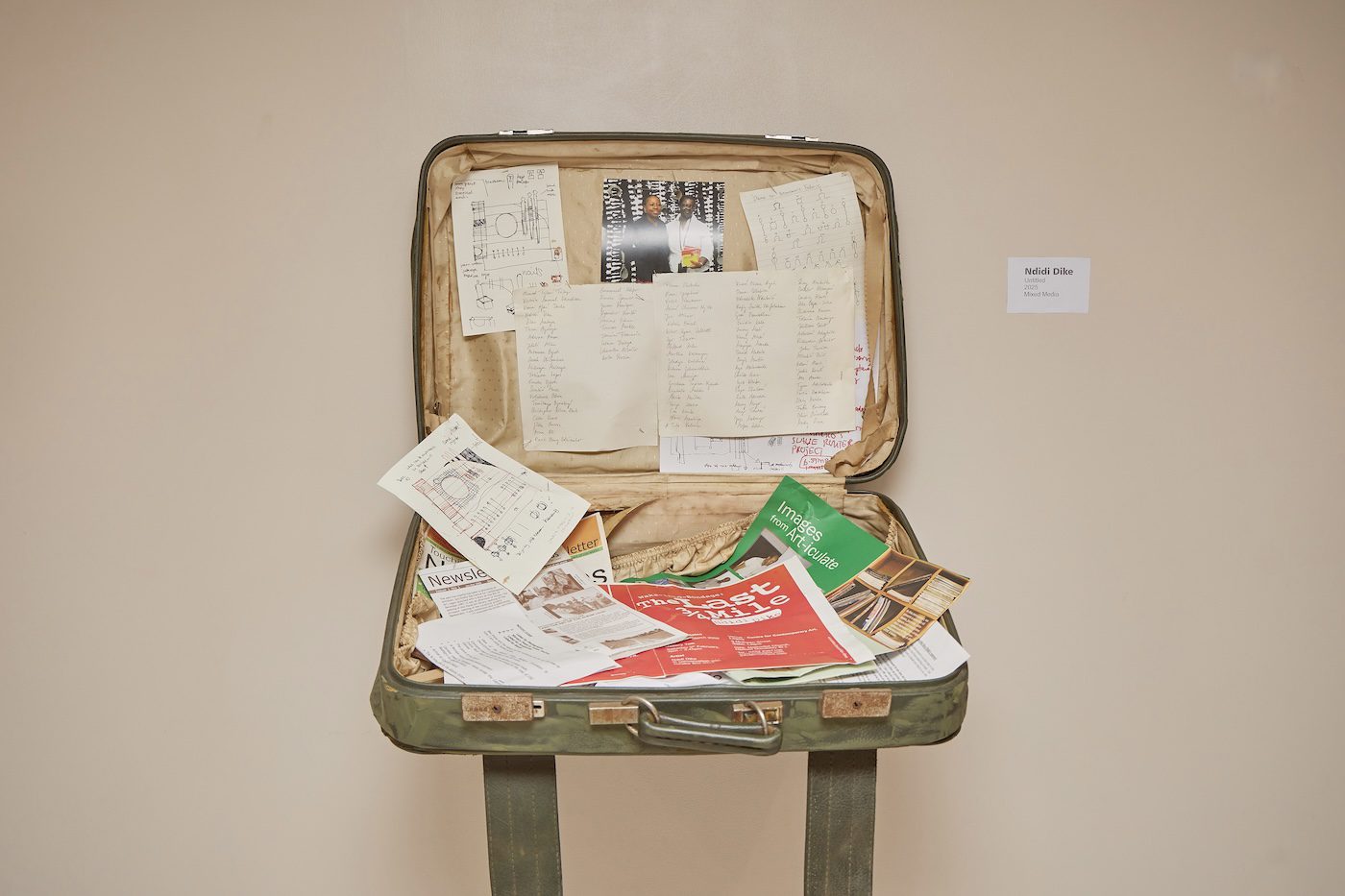
Installation View „Archives and Memories“ at Centre for Contemporary Art (CCA), Lagos. Courtesy of CCA Lagos.
Joshua Segun-Lean: You recently curated the exhibition Archives and Memories at the Centre for Contemporary Art, Lagos. In a sharp departure from your previous curatorial work, the entire process was conducted remotely. How do you think this constraint informed the exhibition?
Favour Ritaro: It was definitely a different kind of experience for me, one that began much earlier than the actual planning of the exhibition. Back in 2020, I worked with a group of curators, Iheanyi Onwuegbucha, Peter Okotor, Mary Osaretin, and others, at CCA Lagos to research and organize Bisi Silva’s curatorial archive. That process lasted about six months, and in many ways, it laid the groundwork for this show. So, while the exhibition was curated remotely, the foundation was built in person, through deep engagement with Bisi’s archive.
Initially I thought I’d be onsite Lagos to curate the exhibition. But when I moved to the US for graduate school and realized I wouldn’t be able to travel, I had to accept that it would have to come together remotely. That was a big shift for me. I’ve always valued being physically present, visiting artists in their studios, walking through the space, responding to what unfolds in real time. This was uncharted territory.
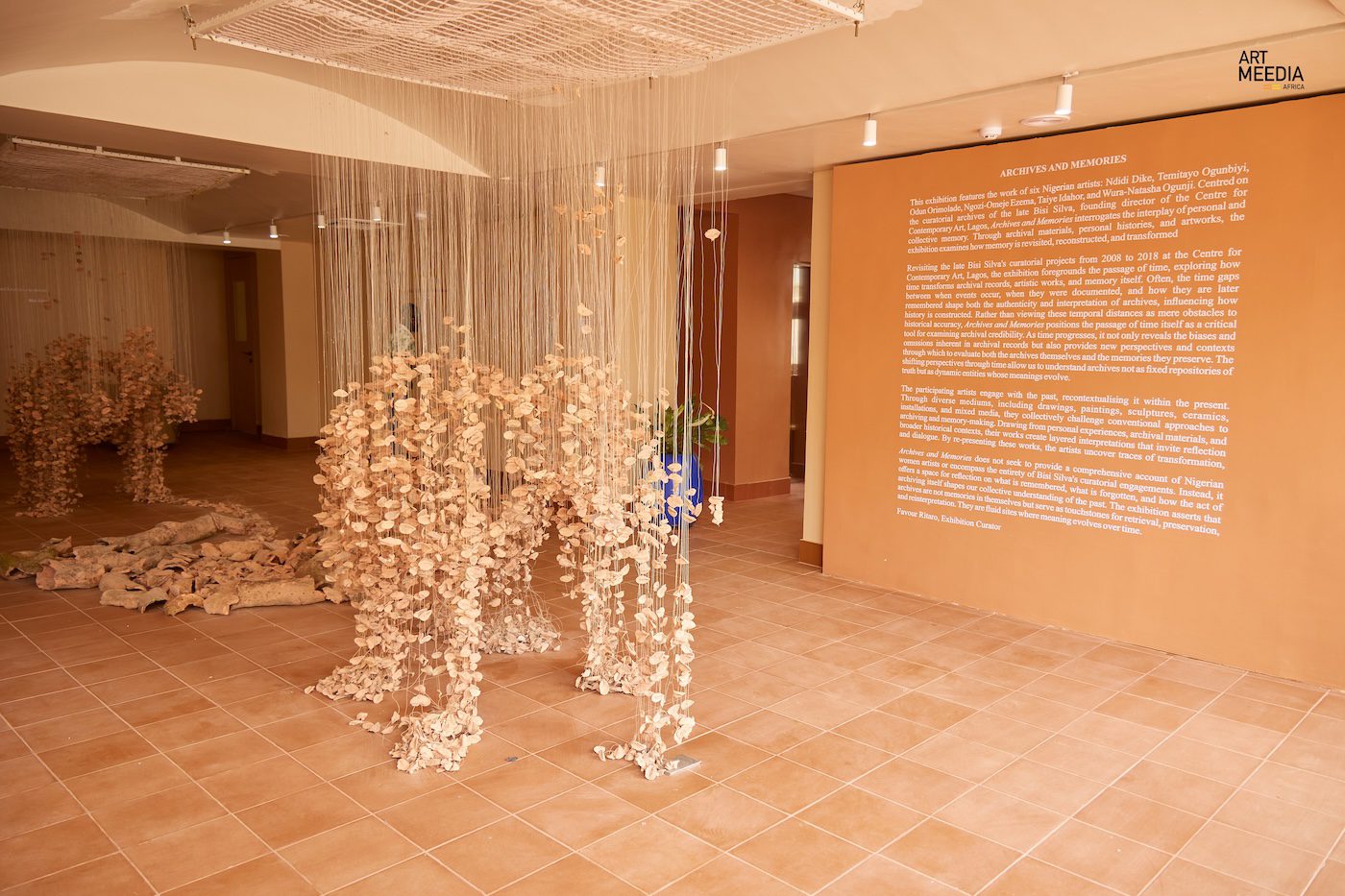
Installation View „Archives and Memories“ at Centre for Contemporary Art (CCA), Lagos. Courtesy of CCA Lagos.
What made it possible was the sense of community that has always defined CCA Lagos. Bisi created a community bound by a shared commitment to supporting one another, promoting the dreams of its members, and fostering an environment where every idea is open to exploration, critique, and acceptance. That spirit carried through in the exhibition planning.
It wasn’t easy. I was physically distant but mentally and emotionally engaged. I was working across time zones, often late at night, trying to stay on top of things while also letting go of some control. But it was also incredibly rewarding. It reminded me that curating isn’t always about being in the room. It’s about building relationships, trusting the team you’re working with, staying open to unexpected shifts, and working in a way that is more fluid than I’m used to.
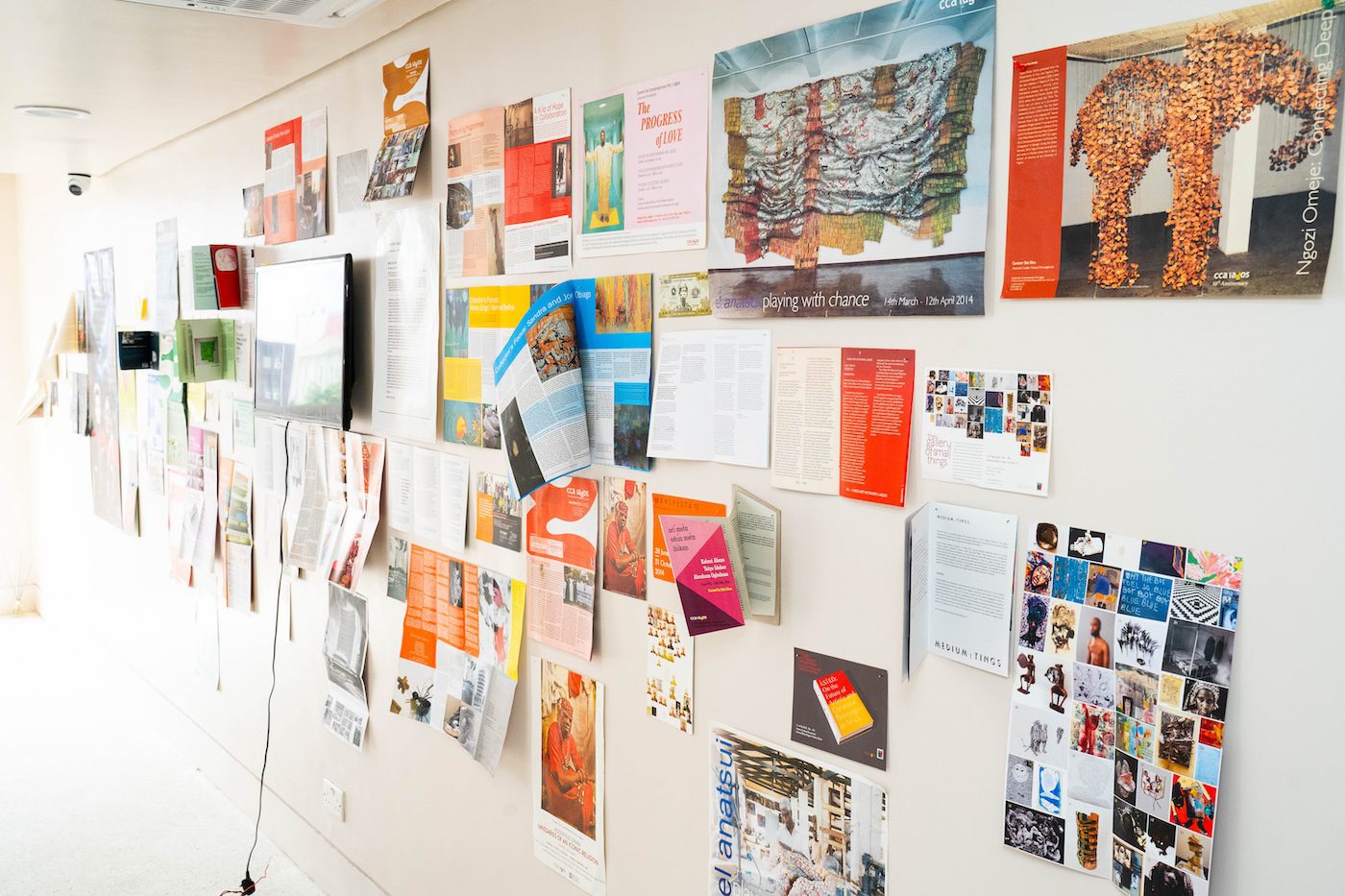
Installation View „Archives and Memories“ at Centre for Contemporary Art (CCA), Lagos. Courtesy of CCA Lagos.
JSL: Having worked closely with Bisi Silva’s curatorial archives, would you say that there’s something about what you’re describing – developing collaborative systems across geographies, being open to indeterminacy, and responding with agility to change – that doesn’t just reflect an ingenuity borne of operational constraints but a working method she would’ve appreciated?
FR: This feels like a question Bisi Silva herself might have asked me! Anyone who’s worked with Bisi knows how rigorous she was about process. One of the most important lessons I learned from her was to treat process with care and intention. She would have interrogated my curatorial decisions thoroughly, especially the attempt to hold curatorial authority when not physically present. But I also think she would have appreciated the flexibility and vulnerability embedded in this exhibition – the acknowledgment that curating across geographies requires building systems of support and being open to what emerges in the unknown.
She would have valued the way my curatorial voice evolved over the four-year development of the project, shaped by ongoing peer-to-peer critique and deep collaboration. Bisi’s curatorial ethos, that insistence on critical inquiry, care, and community, still resonates through the people around me: from Oyindamola Faithful, the current artistic director of CCA Lagos, to the artists involved in the exhibition, who were not just contributors of artworks but active participants in shaping the curatorial process.
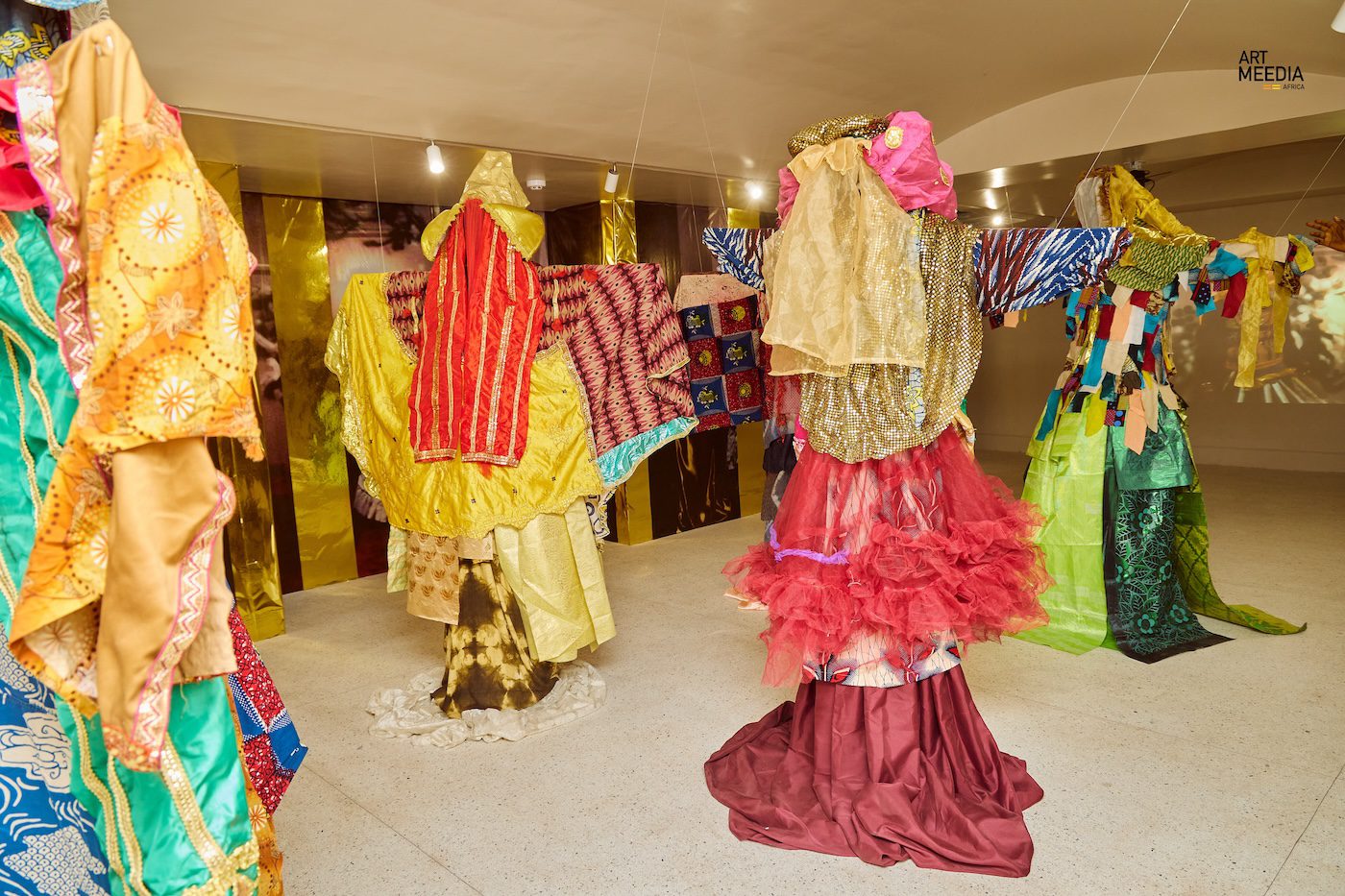
Installation View „Archives and Memories“ at Centre for Contemporary Art (CCA), Lagos. Courtesy of CCA Lagos.
In many ways I still carry her with me. Whenever I’m working on a project, I often pause to ask: “What would Bisi say?” I think she would have recognized the approach I took as a curatorial method in its own right. And I believe she would be proud of the curator I am becoming.
JSL: The exhibition presents new work by a few artists. How did you decide who would feature in the exhibition?
FR: My interest in the exhibition began with a long list I found in Bisi Silva’s notes—names of artists she had been considering for a book project on contemporary Nigerian women artists and, more broadly, on the contributions of women to the Nigerian art scene. As my research unfolded, I was drawn to the connections and intersections between certain artists, many of whom had participated in shared projects and whose curatorial and artistic practices intersected in meaningful ways. Their practices seemed to be in conversation with one another, which naturally shaped the selection.
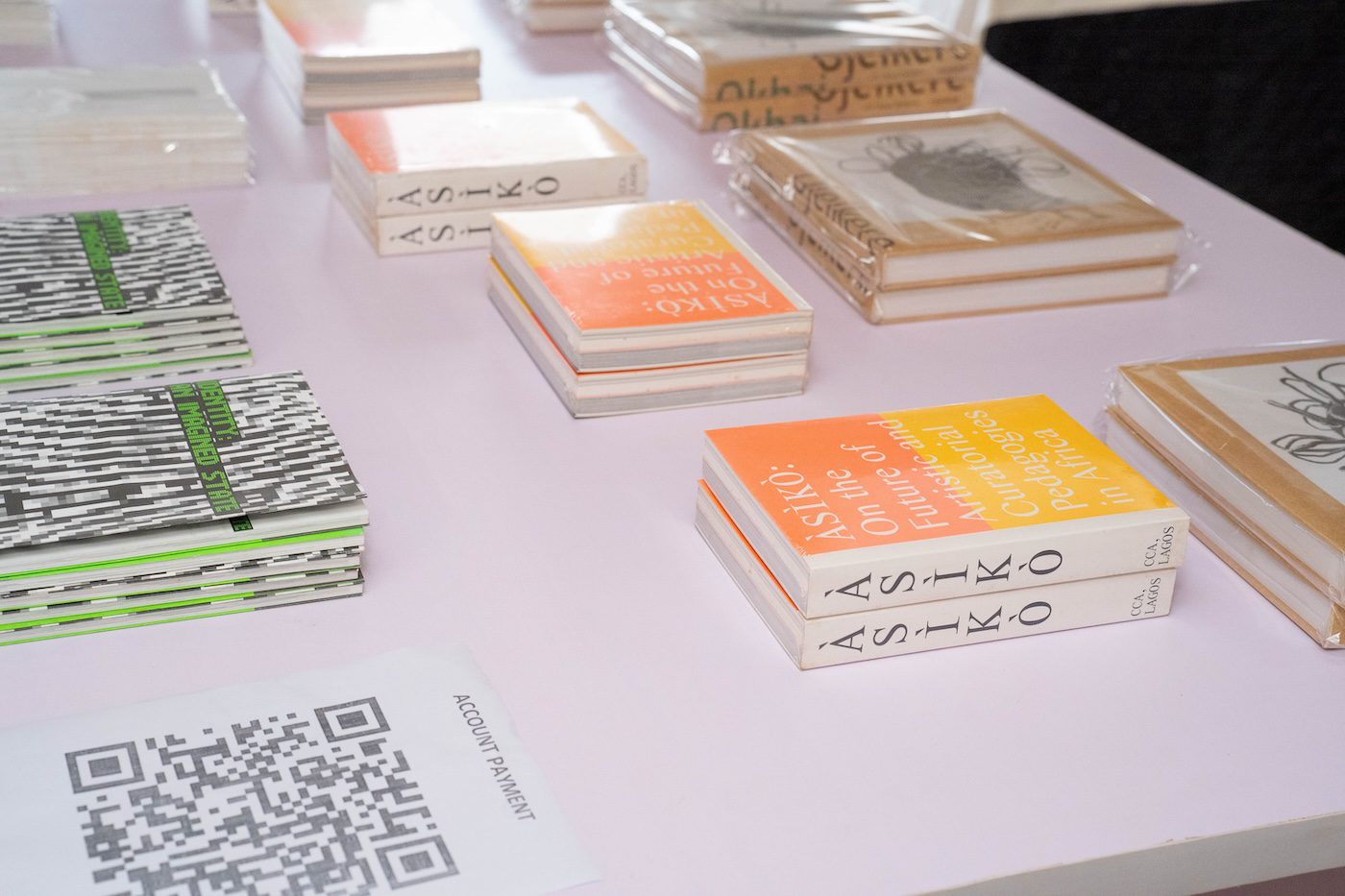
Installation View „Archives and Memories“ at Centre for Contemporary Art (CCA), Lagos. Courtesy of CCA Lagos.
The only deliberate addition outside of that organic web was Ngozi Ezema Omeje. Her solo exhibition Connecting Deep was the last show Bisi curated at CCA Lagos before she passed. In the exhibition Ngozi used the elephant as a symbol of strength and loss, reflecting her mourning for her father. That quietly mirrored the spirit of this exhibition and Bisi’s passing a year later.
Amazingly, months into planning the exhibition, Odun Orimolade, one of the featured artists, asked if I had seen Toyin Akinosho’s documentary Bisi Silva: A Whirlwind Tour Through Art (2018). We retrieved it from the CCA Lagos archive, and watching it together, we heard Bisi mention the very same artists I had selected, praising them as Nigerian women who, in her words, “are giving the men a good run for their money.” It felt like a quiet affirmation, one of those moments when the past reaches into the present to remind you that you’re on the right path.
Archives and Memories curated by Favour Ritaro at CCA Lagos, is still on view until 31 May 2025.
Favour Ritaro is a Nigerian curator whose practice engages histories of personal and collective identity, nationhood, and gender. She is the collections assistant and department manager at the Brind Center for African and African Diasporic Art at the Philadelphia Museum of Art.
Joshua Segun-Lean’s writing has appeared in The Brooklyn Rail, The Republic Journal, and elsewhere.
GIVING BACK TO THE CONTINENT
More Editorial